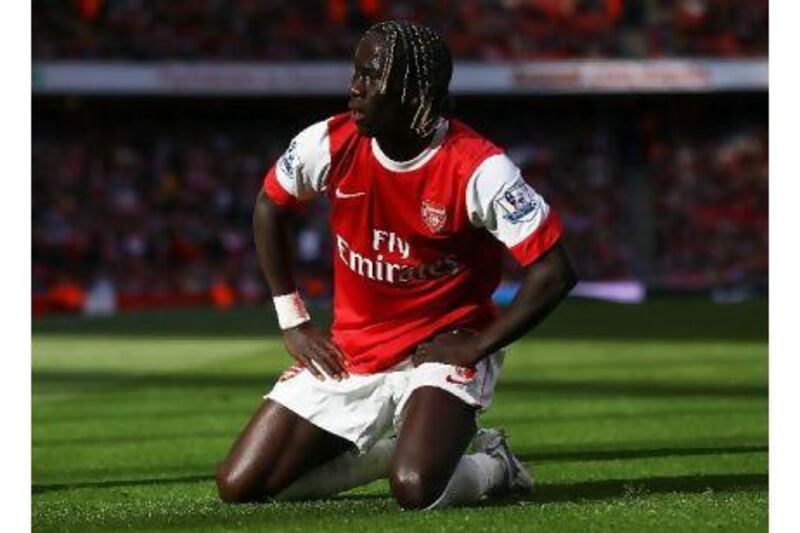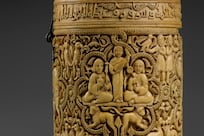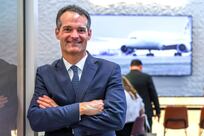There is something reassuring about a footballer who talks in the manner that he plays. The energy that carries Arsenal's Bacary Sagna over more yards than any right-back in the country spills over to tongue and vocal chords, batting back questions with an even smile and a direct honesty.
"How would I describe myself as a footballer? Me, I never give up so I am a very positive guy on the pitch," he said. "Even if I have some problems I never give up. I'm not a great technical player, but what I miss in technique I give in power instead. I think this is the most characteristic thing.
"I'd like to do some tricks like Cristiano Ronaldo. It seems to be easy for him. It's one of my big regrets because I was in a small team until 15 and to do some tricks very well you need to start very young. I used to train maybe once a week. So if my boy wants to play football I will teach him very early."
His boy is Elias, soon to turn two, and the child whose arrival helped Sagna through a dark period when he lost his elder brother to a sudden illness.
"My son, it's magic," he said. "I lost my brother, but a few months later I learned about Elias. I knew my wife was expecting so it was everything at the same time. It was strange, but when I saw him for the first time I was crazy in my mind because it is strange how is life. I lost someone and someone arrived."
The loss of brother Omar was made harder by its suddenness. The elder Sagna had not yet turned 30 when he died in February 2008 after struggling with a liver illness that was not perceived to be life-threatening until it was too late.
"It was cirrhosis," Sagna said. "He was not drinking, nothing. At the beginning they thought it was a bad flu. He went to America for work and when he came back he was sick. We thought it was flu, but he saw the doctor three times.
"And I remember my father calling me every day. Every day I wake up I'm thinking about him. Even on the pitch sometimes.
"He used to call me before each game. Every time I was picked for the national team he used to call me. Small things but I have to accept it's life. I have to deal with it. Now I'm a dad and I have to think after that."
The bereaved Sagna missed just one match - a heavy FA Cup defeat at Manchester United, tomorrow night's league opponents at Old Trafford. He returned to the family home in Sens, an hour from Paris, and prepared to fly to Africa for Omar's funeral until his father counselled otherwise.
Instead, exactly a week after Omar's death, Sagna played 90 minutes in the first leg of a Champions League defeat of AC Milan.
"I went back home to France and I was with my family," he said. "They wanted him to be buried in Senegal and I wanted to go to Senegal, too. But my father advised me to come back [to England] because maybe in Senegal people would have come for me and not for my brother, and instead of making me better it could have made me worse.
"He said to me: 'I advise you to come back and to play if you can.' Before the game I felt bad. When we came on the pitch I felt very bad. But I had to play because it wasn't just me. I had to play and think about the game for one hour and a half. I played OK. But I wanted to score in that game. I was so hungry. And I'm still hungry. I'm hungry to win for my brother and I will be until I stop football."
There is little difficulty in understanding why Arsenal's failure to win a trophy in his three-and-a-half seasons at the club has fed a rage within Sagna.
A converted forward, who enjoyed operating at full-back from the moment he realised "now I could kick", the tirade with which he met last month's naive capitulation to Tottenham Hotspur encapsulated that drive to succeed.
"We, the players, were the ones most responsible," he said. "When you're 2-0 up at half time, you do not have the right to concede three goals. Still more so at home. We tried to go and score the third goal that would have killed them rather than stay in position and defend well.
"We cannot afford to attack like crazy, like we did. Every time we got caught on the counter attack. It's always the same. And we do not heed the lessons. That is unforgivable."
For Sagna, it is important to remember. And he wants to do so with a trophy in his hands.
Tomorrow, midnight, Abu Dhabi Sports 3 & 5





